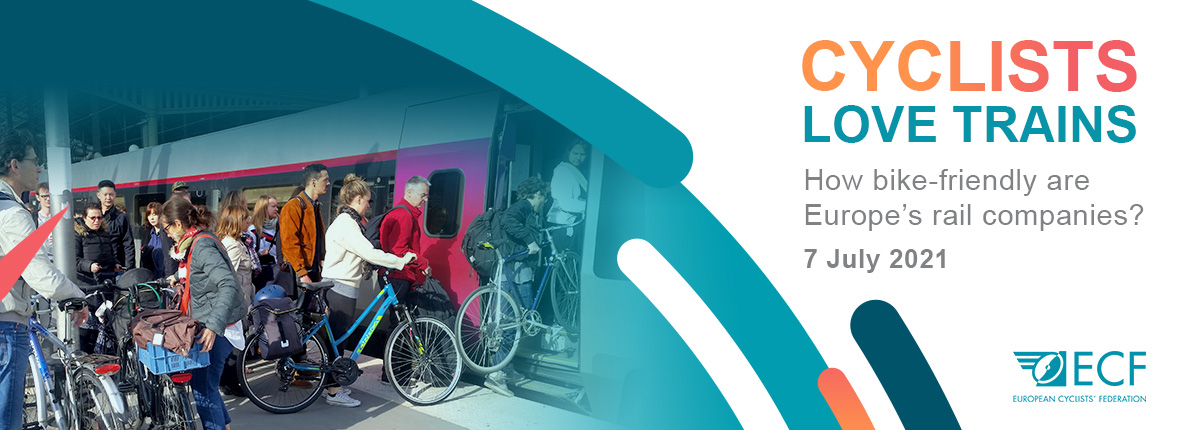
Making Europe’s train companies more bicycle-friendly
After ECF’s successful campaign to change EU rail passengers’ legislation, a new ECF report on the bicycle friendliness of 53 European railway operators marks the next stop on the line to improving bicycle access on Europe’s trains.
A new journey began for cycling advocates in May 2021 when the updated EU Rail Passengers’ Rights and Obligations Regulation was formally adopted. Last year, the European Cyclists’ Federation (ECF) achieved significant improvements* for cyclists travelling by train, including a minimum of four bicycle spaces on new and refurbished trains, when the regulation was up for review.
Focus now changes to how the new EU requirements are implemented by rail operators and enforced by member states. The rules will start to be applied in two years’ time (7 June 2023), with the exception of the bicycle space requirements, which will be applicable four years after the regulation’s entry into force (7 June 2025).
As this EU-level legislation is unlikely to be reviewed again in the short to medium term, some rail operators have already begun to act. On 8 June, the Belgian national railway company published a new cycling strategy aimed at providing more space for bicycles on trains, clear signing, more bicycle parking and better information. As already seen in France, some member states can even go beyond EU requirements: a new law requires at least eight bicycle spaces on most French rail services.
How bike-friendly are Europe’s rail companies today?
To inspire European countries and help guide both industry and policymakers in identifying areas for improvement within the current bikes-on-trains landscape, an upcoming ECF report titled “Cyclists love trains: An analysis of the bicycle friendliness of European railway operators” will be launched on 7 July at a high-level online event.
For this new report, ECF has undertaken a systematic analysis of the bicycle friendliness of 53 European rail companies, looking at a range of criteria such as bike carriages, fees charged and booking channels to come up with a ranking of the most “bike-friendly” rail operators across the continent. The report coincides with the European Year of Rail and will help identify which rail operators roll out the red carpet for passengers with bikes and which ones need to do better.
Next steps for better bikes-on-trains intermodality
The success of ECF’s Cyclists Love Trains campaign in 2020 showed that there is plenty of demand for more bikes on trains. Member states and railway operators will need to adapt if they are to meet the needs of a growing number of travellers today and conform with the updated Rail Passengers’ Rights and Obligations Regulation.
Join us for the online event on 7 July to mark the launch of the report and discuss its findings. The event will be moderated by Laura Laker, Guardian contributor and host of the Streets Ahead podcast, and will include a presentation of the report, a keynote speech, and a panel discussion with high-level policymakers and industry representatives.
“As someone who’s taken bikes, or tried to take bikes, on a fair few trains across Europe, with varying degrees of peril, this is certainly a passion of mine and should be an interesting event,” commented Laura Laker on Twitter.
* The updated Rail Passengers’ Rights and Obligations Regulation includes:
- Statutory (default) number of four spaces for bicycles on all new or refurbished rolling stock (as a minimum).
- If rail operators want to provide less than four bicycle spaces on a particular train composition, they need to justify it in “plans on how to increase and improve the transport of bicycles and on other solutions encouraging the combined use of railways and bicycles.” Such plans must be subject to public consultation.
- Member states can also determine a higher number, which should take precedence over the railway operator’s plans.
- Passengers with a reservation for their bicycle that are refused carriage without a duly justified reason are entitled to “re-routing or reimbursement, compensation and assistance.”
- It is made clear that the regulation refers to bicycles that can be readily ridden (ie bicycles in bags or boxes are treated under the provisions relating to luggage).
- Increased number of references to the need for rail operators to clearly communicate the conditions of carriage to their customers.
Contact the author
Recent news!
Upcoming events
Contact Us
Avenue des Arts, 7-8
Postal address: Rue de la Charité, 22
1210 Brussels, Belgium










